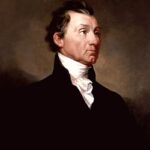The Constitutional Crisis
President James Monroe’s vetoes of internal improvement projects created a major constitutional crisis in 1822. Monroe internal improvements policy reflected strict constitutional interpretation. He argued the federal government lacked authority to fund roads, canals, and bridges. The Cumberland Road Bill became his most controversial veto target. Congressional majorities supported these infrastructure projects overwhelmingly.
The Economic Arguments
Supporters argued internal improvements would boost national commerce significantly 📊. Roads and canals would connect eastern markets to western territories. Transportation improvements promised reduced shipping costs for farmers and merchants. Monroe’s vetoes blocked projects worth millions of dollars in economic development. Critics claimed his interpretation ignored the Constitution’s “general welfare” clause completely.
Political Opposition
Congressional leaders from both parties criticized Monroe’s rigid constitutional stance ⚠️. Henry Clay’s American System depended heavily on federal infrastructure funding. Western states needed improved transportation to reach eastern markets effectively 💰. Monroe’s vetoes frustrated regional development plans across multiple states. Political opponents accused him of favoring theoretical constitutional purity over practical national needs.
Impact:
Economic Development Delays
Monroe internal improvements vetoes significantly delayed American infrastructure development 📉. Private companies couldn’t fund large-scale canal and road projects alone. Western territories remained isolated from national markets for years longer. Agricultural products rotted in remote areas without adequate transportation networks. The delays cost the economy millions in potential commerce and growth.
Constitutional Precedent
Monroe’s strict interpretation established important constitutional precedents for federal spending limits. Future presidents cited his vetoes when opposing infrastructure spending bills. The debate intensified discussions about federal versus state government responsibilities 🔥. Legal scholars still reference Monroe’s constitutional arguments in modern spending debates. His position influenced decades of internal improvement legislation.
Regional Tensions
The vetoes increased tensions between different regions of the country significantly. Western states felt abandoned by federal policy decisions consistently 🌍. Eastern manufacturing interests supported improved transportation for market expansion. Southern states generally approved Monroe’s limited federal government approach. These regional divisions contributed to growing sectional conflicts throughout the 1820s and beyond.
